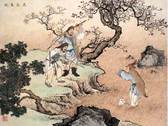Stories about exemplary filial conduct abound in Chinese history. The Twenty-Four Examples of Filial Piety were chosen and compiled by Guo Jujing from the Fujian Province during the Yuan Dynasty (1280-1368 CE) while he was mourning the death of his father. He recounted the feats of filial children towards their parents from the age of the primordial Emperor Shun down to his own era. Even today, these stories form an important part of orthodox Chinese virtue.
 |
Tan Zi Brought Deer’s Milk to His Ailing Parents
During the Spring and Autumn Period (722 – 481 BC), there was a filial son in the Tan family whose name has not been recorded. People simply referred to him as Young Master Tan. While he was quite young, both his parents came down with an eye disease that the doctors said could only be cured by giving them deer’s milk to drink. As the family was very poor, and deer milk was both rare and expensive, the young boy was upset and worried that he wouldn’t be able to provide the medicine that could cure his mother and father.
Wandering out in the mountains, he pondered the situation, but couldn’t come up with a solution. There in the meadow before him, a herd of deer grazed. Tan Zi stood patiently while the spring’s crop of young fawns frolicked, ran, and then returned to their mothers to nurse on milk.
The next morning, dressed in a deer’s skin, with head, tail and fur, Tan Zi set off for the mountain meadow with a bucket in hand. When the young deer ran, Tan Zi ran beside them. When they grazed, he stood and pretended to graze too. When they came to their mothers for milk, Tan Zi got milk from the mother deer as well, only the milk went into his bucket, not into his stomach.
When the day was over, Tan Zi carefully walked back down the mountain, carrying a full bucket of milk, delighted with the success of his plan. His parents were overjoyed to have deer’ milk to drink, and praised their clever, considerate, and resourceful boy. The next day, Tan Zi returned to the meadow and again played with the fawns, and again returned home at sunset with a bucket of milk. So it continued for weeks, and his parents began to recover their sight.
One day as Tan Zi was playing amid the young deer, the herd leaders suddenly bleated, picked up their white tails, and ran for the trees. The herd followed in fear, leaving Tan Zi alone in the middle of the meadow. He looked towards the path and saw why the deer had fled. A fierce-looking hunter with bow in hand was standing in the shade, prepared to shoot some venison.
Arrows began to zip past Tan Zi’s ears, their deadly whistle much too close for comfort. The boy quickly stood up, threw back his deerskin cloak and loudly shouted, “I’m a person, not a deer. Don’t shoot!”
The hunter was shocked. “Hey, Boy! What are you doing here in the woods! I nearly killed you! Why are you dressed up like that?”
Tan Zi answered, “My parents are sick and need deer’s milk to drink in order to recover. I disguised myself as a deer so that I colud get the milk.”
Deeply impressed, the hunter said softly, “You are certainly a rare child, to go to so much trouble for your parents. But this is dangerous! If you had waited one minute longer to reveal your identity, I would have shot you down. Be more careful in the future!”
After this warning, the hunter escorted Tan Zi safely out of the forest and back home.
A verse in his honor says,
His parents needed milk, their eyes to cure,
He robed his body in a suit of fur.
If he had failed to shout aloud, “Don’t shoot!”
The hunter would have killed him for a deer.
* * *
You are welcome to print and circulate all articles published on Clearharmony and their content, but please quote the source.










 more ...
more ...